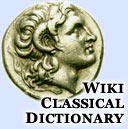
Texts on the Web
Multiple authors | Plutarch | Diodorus | Arrian | Curtius | Justin | Other authors | Inscriptions | The Alexander Romance and other stories | The Suda | Other ancient sources of interest | Original-language texts | Spurious
Multiple authors
William M. Murray's selections. Organized by topic, Murray covers the
Methodologies of the Major Historians, together with Granicus, the Gordian Knot (digging as deep as a scholium to Euripides!), Issus, the correspondence with Darius, Alexander in Egypt, the revolt of Agis III, Persepolis, the Philotas affair, the "mutiny" at the Hyphasis, Carmania, the "brotherhood of mankind," the "last plans," etc.
![]()
See Jona Lendering's
overview of all articles on Alexander for selections from the five major sources, as well as harder-to-find authors like Polyaenus, Appian and Babylonian sources.
![]()
The Murder of Philip II of Macedon in 336 BC , a whodunnit / source compilation, for Elizabeth Carney's course
Alexander the Great and Ancient Macedonia.
![]()
Arrian on Alexander the Great, Arrian on Alexander's Major Battles and Plutarch on Alexander. Generous excerpts from Chinnock and Clough's translations, edited by Dr. Nicholas Pappas, Sam Houston State University.
Alexander Sources. Susan Holmes' site for various major and minor sources. The site is ambitious, but needs work. The best feature is Arrian—Chinnock's Arrian in full, or mostly[1]. There are some good "minor" sources (Aulus Gelius). HTML quibbles.[2]
Plutarch
Complete text:
Plutarch, Life of Alexander, translated by John Dryden, from Ed Stephan's
The Greek World of Mary Renault.
![]()
Plutarch's famous lines on the writing of biography, from the Life of Alexander.
Jona Lendering assembles selections from Plutarch on: The birth of Alexander, Bucephalus, Alexander and the Persian envoys, Aristotle and Alexander, Alexander's first regnal year, Alexander's visit to Troy, Battle on the Granicus, The Gordian knot, Alexander's illness after swimming in the Cydnus, Alexander's behavior after the battle of Issus (including the "royal women"), The foundation of Alexandria, and Alexander's significance.
Alexander's Place in History from Plutarch, "Concerning the Fortune or Virtue of Alexander the Great" (trans. Philips), from Houghton Mifflin's Mosaic.
Web Archive: Alexander's birth (Plutarch) from Cartledge and Duggan, Documents for the Study of the Gospels.
Plutarch, "Alexander the Great's Habits" (wine and proskynesis), from Houghton Mifflin's Mosaic.
Complete text: Plutarch, On the Fortune or the Virtue of Alexander the Great (Philips/Goodwin translation). Stark also has also posted a massaged version of the Clough/Dryden Life.
Selections from the Life of Alexander (Ancient History Sourcebook).
Diodorus
Complete text: Diodorus, Book 17. Greek text and English translation, from Tuft's Perseus Project.
Jona Lendering assembles selections from Diodorus on: the battle of Chaeronea, the accession of Darius III, the death of Philip, the sack of Thebes, Alexander's army, the battle of Issus, the destruction of Persepolis, Dioxippus and Coragus, Alexander's decree on the exiles, Alexander and the Chaldaeans, Alexander's last plans, the revolt of the Macedonian veterans.
Diodorus on the burning of Persepolis (17.20-22).
Diodorus Siculus on the Battle of Chaeronea (338 B.C.), from the Ancient History Sourcebook.
Diodorus Describes the Macedonian Plunder of Persepolis from Diodorus (trans. Welles), from Houghton Mifflin's Mosaic.
Arrian
Complete text: Chinnock's Arrian from Susan Holmes' "Alexander Sources."
Jona Lendering assembles selections from Arrian (Anabasis and Indica) on: Alexander's letter to Darius, Alexander's visit to the oracle of Ammon (at Siwah), The death of Darius, the capture of the Sogdian rock, proskynesis (prostration), Alexander's visit to Nysa, the meeting with the Indian sages, mutiny on the Hyphasis, on the trierarchs, the Gedrosian desert , Nearchus' voyage home and again, Alexander's administrative measures, Alexander's visit to the tomb of Cyrus, the death of Calanus, the marriages at Susa, the mutiny at Opis, on the foreign embassies, Alexander and the Chaldaeans and the death of Alexander.
Speech of Alexander the Great in India (Ancient History Sourcebook)
Arrian on Proskynesis (4.10.5–11)
Arrian Describes Alexander's Campaigns in India from Diodorus (trans. Rooke), from Houghton Mifflin's Mosaic.
Alexander Writes to the Persian King, Darius from Arrian (trans. Rooke), from Houghton Mifflin's Mosaic.
Complete text: Arrian, Indica (complete). Trans. E. Iliff Robson, 1933. Marvelous work. Now we need an online commentary for it! (University of Natal, Duban) Also other documents of interest .
Curtius
Jona Lendering assembles selections from Curtius on: the fall of Tyre, the death of Batis, the surrender of Babylon, the rape of the Babylonian women, on the Hindu Kush, on the Bactrian desert and the bacchanal in Carmania.
A Brief History of Religious Sex. Quotes Curtius on Babylonian prostitution. Also here.
Justin
Complete text:
Justin (trans. John Selby Watson). Alexander is found in
book 11.
![]()
Jona Lendering assembles selections from Justin on: the Corinthian league. Hey, that's it? What's up Jona? :)
Other authors
Josephus on Alexander's Visit to Jerusalem (trans. William Whiston), from Livius.org.[3]
![]()
Josephus' Antiquities of the Jews" Bk. 11 (see chapter 8 ff. for Alexander's visit to Jerusalem)
Zoroastrian sources on Alexander, collected by Jona Lendering.
![]()
Athenaeus, Gastronomers 13.601-606 on Alexander and Bagoas, etc. From "People with a Story."
Web Archive: Quote from Philostratus' Life of Apollonius of Tyana on Alexander.
Aelian, VA 7.8 on Alexander's reaction to Hephaestion's death from Iolaus: An anthology of Friendship by Edward Carpenter (1908). From "People with a Story."
Cynic diatribe #1 (from Duke), Cynic diatribe #2 (from Duke).
Selection from Artemidorus' Oneirocritica, translated by Robert J. White. The publishers are New-Age loonies but the translation isn't (they republished it with no textual changes). The passage quoted is Artemidorus' reference to a work of Aristander, Alexander's favorite prophet.
Inscriptions
Alexander's Second Letter to the Chians (SEG, XXX, 1072, fr. a) Center for the Study of Ancient Documents.
Dedication by Alexander the Great to Athena Polias (Priene, c. 330 B.C.), from the British Museum.
"King Alexander dedicated the Temple to Athena Polias."
Alexander's letter to the Chians translated by J.C. Yardley, from Jona Lendering's Livius.org.
3c. A.D. inscription in Alexander's Honor (Thessalonica).
The Alexander Romance and other stories
Alexander the Great and the Jewish Barber, an Iraqi Jewish legend. The two horns come from the Arabic name, ultimately based on his elephant-helmet coins.
"The Prose Life of Alexander" Early English Text Society. Online version of English Romance.
Large sections of a Byzantine Alexander-romance (versio phi) translated by someone who thinks his copy is the only one existing. (He won't budge, he even sent me photocopies. Some people can't be talked to.) Translations are scattered about, but try "Alexander as a Boy."
The Suda
Suda: Alexander the Great (Trans. J. Benedict). The Suda is a medieval Greek encyclopedia assembled from earlier sources.
Suda: Antipater (trans. G. Shipley)
Suda: Anaximenes, one of Alexander's tutors (trans. M. Heath)
Suda: Marsyas, son of Periander , writer on Alexander and Macedonia (trans. R. Scaife)
Suda: Strattis, writer on Alexander. This is one of those entries we would all like to be a bit fuller! (Trans. D. Hamel)
Suda: Seleucus Nicanor (trans. G. Shipley)
Suda: Bagoas ("Proper name. He was a eunuch") Trans. J. Arnold
Suda: Chaldaean Sibyl , prophecied about Alexander (Trans. J. Benedict)
Suda: Xenocrates, untalented philosopher, sorry (trans. D. Whitehead)
Suda: Alexander's love for flute-playing.
Other ancient sources of interest
Arrian,
Events after Alexander. Photius' epitome, translated by John Rooke (1814). Now on the web for the first time. From my
Classical Library site.
![]()
Lucian's Life of Alexander of Abonoteichos Very interesting text about 2nd c. Paphlagonian religious charlatan (or was he?). Lucian slipped in subtle but pervasive references to Alexander's more famous namesake. See also my directory about Alexander of Abonoteichos.
Demosthenes Exhorts Athenians to Resist Alexander from "On the Treaty With Alexander" (trans. Kennedy), from Houghton Mifflin's Mosaic.
Demosthenes, On the Accession of Alexander (Perseus). Greek text and translation.
Diogenes Laertius, "Life of Anaxarchus," C. D. Younge (Loeb) translation. Alexander comes up a few times.
Another edition of Plutarch, Alexander translated and shortened by Wilmot H. McCutchen, with basic vocabulary.
Original-language texts
Curtius in Latin (Lacus Curtius). Also here.
Justin, Epitome of Trogus book 12 (Latin text).
Frontinus' Strategmata (Latin text)
Spurious
Fake "Letter of Alexander to Aristotle." Posted on the Republic of Macedonia website, it's actually from a short story. The letter and its deconstruction by the Internet History Sourcebook is one of the funniest things on the web.
![]()
Republic of Macedonia's "Aristotle's Letter to Alexander" (they've admitted their error).
Quotes from Alexander (or so he believes, but I don't think Alexander was much concerned with faith, hope and charity).
Notes:
- Where is Arrian's introduction? (back)
- The frame structure and search need work, and there are CSS problems on my machine at least. (back)
- Incidentally, a good article on Alexander's supposed visit to Jerusalem is Arnaldo Momigliano's "Flavius Josephus and Alexander's Visit" (1979) printed in Essays on Ancient and Modern Judaism and Athenaeum n.s. 57. (back)


Wiki Classical Dictionary, currently focused on Alexander
All material © 2000–2005 Tim Spalding.
Presented in Association with Amazon
If you enjoy this site you may also like these other sites by me:
Genghis Khan on the Web More than 275 links about the Mongol conqueror.
Cleopatra on the Web Over 410 resources on Cleopatra. Includes 168 images.
Ancient Library and the Wiki Classical Dictionray, major new reference sources for ancient studies.
Hieroglyphs! Over 125 links about Egyptian hieroglyphs for all ages and levels of knowledge.